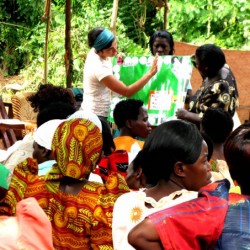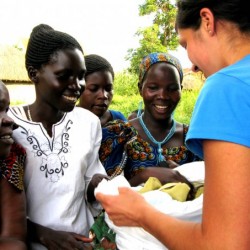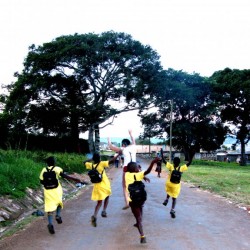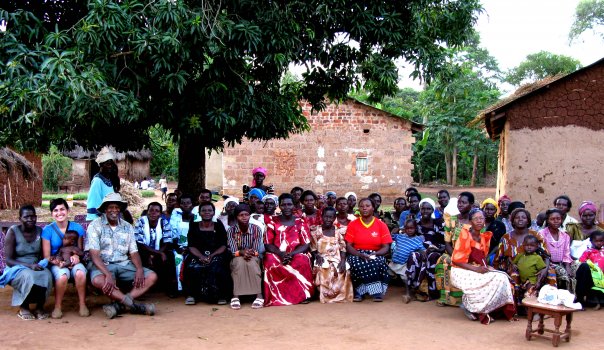Courage of her convictions: Jessica Sahely finds a way to help Ugandan women
November 3rd, 2009 Posted in Arts and LifeBy Candice Mattson
Jessica Sahely found herself standing on a platform overlooking the Nile River, her feet bound by thick cords. The water glided along smoothly below, gently tousled by some rapids and a small cascade. The banks were lined by lush vegetation leading up a steep embankment to where she stood. It wasn’t captors who were forcing her there, but she was standing on the platform by her own free will. After taking a few moments to gather her courage, she willingly plummeted toward the cascading waters below.
This experience of bungee jumping over the Nile capped off what was the trip of a lifetime for this Logan native. Over the course of a month this past summer, she had traveled through Uganda, teaching public health seminars to the women of that nation and now her journey was at an end.
Sahely graduated from Utah State University in 2007 with a major in sociology and minors in international studies and women and gender studies. Although parts of these programs were interdisciplinary, she felt like she received the focus that she wanted from her classes.
“It was actually a class in the sociology department called Women and International Development where everything just came together and I knew that’s what I wanted to do in life,” she said.
 “Because we are women, we are naturally advocates of women,” she said. The idea of being able to connect with women across the globe because of that simple similarity appealed to her.
“Because we are women, we are naturally advocates of women,” she said. The idea of being able to connect with women across the globe because of that simple similarity appealed to her.
Sahely used her interest in being a woman’s advocate in her internship with Bear River Health Department that focused on lowering the rising pregnancy rate among Latina teens. This piqued her interest in public health.
“People’s health is important to them, it’s something that affects everybody. It’s kind of the way I could target every single person in the entire world, I felt like I could help everyone in that sense. It doesn’t put any barriers between you,” she said.
A few years ago, Sahely decided she would travel to Uganda. She was interested in the so-called “invisible children,” and the many injustices committed against women.
Northern Uganda has been the battleground for the war between the Lord’s Resistance Army and the Ugandan Army. According to the BBC, the LRA constantly abducted children to serve as sex slaves and soldiers. Humanitarian organizations reported that about 20,000 children were abducted from between 1998 and 2003.
Around this time, three young filmmakers from the United States traveled to this part of war-torn Uganda and saw these atrocities happening to children. They made a documentary about the invisible children, according to the documentary’s Web site.
To afford the trip, Sahely raised money from relatives and by organizing a benefit concert with her friends that helped raise about $800. She said she planned on going soon after, but that summer, her sister got married. The next summer, she went on a vacation to Guatemala. Uganda remained her goal, but she found herself struggling with the courage to go.
 “It was more of a gut feeling,” she said. “I kept waiting for the right time.”
“It was more of a gut feeling,” she said. “I kept waiting for the right time.”
Then Sahely received a phone call from a friend and co-worker who was going to Uganda with the USU Chapter of Engineers without Borders and invited Sahely to come along. At first she politely declined, citing her lack of engineering knowledge.
A retired USU professor and chapter volunteer, Bill Grenney, was interested in having someone teach public health seminars, and the news was passed along to Sahely. She was a little hesitant at first because she had only a year of grad school experience in public health. Grenney said that if she had the desire to go, that would be enough. She said she felt confident going with Grenney because of his many trips to the country.
According to their national Web site, Engineers Without Borders is an organization that “helps create a more stable and prosperous world by addressing people’s basic human needs by providing necessities such as clean water, power, sanitation and education.” The local USU chapter sends teams to Peru, Uganda and Mexico.
Sahely joined the group and soon started assessing the needs of the Ugandans, such as natural family planning. However, she was allowed to teach only women; no men are allowed in the room because women’s issues are still considered taboo.
She started teaching her seminars in Masaka, a village in the southern part of the country by Lake Victoria. Sahely said Grenney had contacts at an orphanage there and is trusted by the people because of his frequent aid. Eventually, she ended up “going on tour” with others in about 10 villages around the country, staying in hostels and hotels while teaching the seminars.
One person accompanying her on her tour was Kate Searles, a 17-year-old Logan High School student. Searles, Sahely’s co-worker, said that Sahely invited her to go one day and she accepted her offer.
 In addition to teaching public health seminars, they helped do vision screenings with John Shavers, who runs a non-profit organization in Salt Lake called the Interethnic Health Alliance.
In addition to teaching public health seminars, they helped do vision screenings with John Shavers, who runs a non-profit organization in Salt Lake called the Interethnic Health Alliance.
“We had a ton of glasses donated and we would just judge by what we tested, what prescription they needed and give them glasses and ask them if it was better or worse,” Sahely said.
One topic they would discuss in their seminars was the menstrual cycle. They made women’s hygiene kits for the Ugandan women that included cloth pads that they could wash and reuse. They also taught children how to do simple hygienic things such as washing hands and brushing teeth.
Gulu, located in northern Uganda, was Sahely’s favorite place to visit. Because of the war, many women in this city had been raped, tortured and widowed. Some women had been left to raise the children of their rapists without a source of income. She recalled one of her first lessons in the city.
“I usually started off with a women’s empowerment message,” Sahely said. “The whole idea was to get these women to bond together to see if they could rise up that way. And as soon as we started talking, I felt impressed to tell these women that we had nothing to offer them in the sense of empowerment and building them up, because they are living representations of women who haven’t given up in the worst of times.”
The women in this village wanted to start their own businesses with the help of microloans, which are very small, short-term low interest loans, Sahely said. The women looked forward to the future and wanted to provide for their families. Because of this, the spirit of the village stuck with her the most and she hopes to go back.
She was also impressed by the Ugandans’ willingness to take care of each other and show affection, despite all the war and strife. She smiled as she talked about their dancing. The people of Uganda would tell her that they were so poor, that song and dance was all they could give.
“Somebody would be walking down the street and somebody else will be dancing on the side, and this person will stop and get in on the dancing,” she said. Dancing helped to unite them.
Although Sahely traveled throughout the country, shared plenty of information, and helped many people try to live a better life, she insists that the people of Uganda gave her more in return than she could ever give.
“You always come back with this idea where you’re going down to give them something, but you come getting more. Such a cliché thing, but you really do,” she said.
If Sahely thinks that she didn’t make a difference, Kate Searles disagrees. She said after they were done teaching seminars, women would walk up and thank them for actually listening to their stories.
“I think she is the most amazing person I’ve ever met, really,” she said. “She just makes me want to be a better person. When she’s in the room, she makes me feel stronger.”
Just like bungee jumping, it took courage for Sahely to go to Africa. And also like bungee jumping over the Nile River, Sahely said it was the experience of a lifetime.
SeeeMe (Sustainable Engineering, Economics, and Education), the non-profit group that Jessica Sahely is a part of, is having a meeting Wednesday, Nov. 4 at 7 p.m. at the Logan Rec Center’s classroom. Anyone who wants to help in any way is welcome to come.

Photos courtesy of Jessica Sahely
Tags: invisible children, Jessica Sahely, seminars, Uganda, women's health

2 Responses to “Courage of her convictions: Jessica Sahely finds a way to help Ugandan women”
By ssentamu phillip on Nov 4, 2009
well am in uganda and have got a chance to help jesca,kate and the other groups carry out their works. am the son to mr ssentamu anatoli the director of the orphanage(byana mary hill) in masaka so i really feel for the orphanes like my dad. though i haven’t been able to attend the meeting am working on my papers to come to dexie state college in U.S to do an engineering programme so that i could be of more importance to the orphanage though i really need a sponsor
to releave my dad of the burden so he could help the orphanage more. thank you
phillip uganda.
By Wakil on Dec 12, 2009
This is just great. Jessica helps needy people and by being woman’s advocate. I admire Jessica for her hard work to leave home and go out thousands of miles away and help out people in Africa. I belive that every one needs someone to help and admire. It is part of our socializing process when we are young and active to help out and make a difference, make as many good friends.
Keep up the good work Jessica.